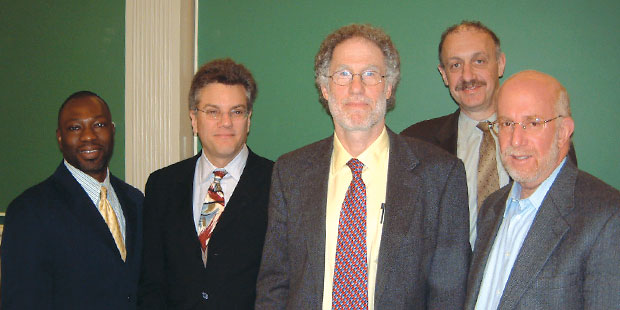A Tale of Two Parties
Printer Friendly VersionOn a typically frosty Wednesday in early March, students in Professor Samuel Issacharoff’s Law of Democracy class knew they were in for something special.
On the morning’s agenda was an informal yet dynamic discussion between Robert Bauer and Benjamin Ginsberg, principal lawyers for the Democratic and Republican parties respectively, each with a distinct perspective on the complicated nature of the American election process.
On hand to provide further analysis were Sudler Family Professor of Constitutional Law Richard Pildes and University of Minnesota law professor Guy-Uriel Charles.
“These are the people who have shaped the way that politics is done in the United States—for better or worse,” said Issacharoff, the Bonnie and Richard Reiss Professor of Constitutional Law, as he introduced Bauer and Ginsberg. “Both play a critical role in the way our political system functions.” Issues such as redistricting, voter exclusion and campaign finance reform came to life in the firsthand stories and anecdotes of these two Beltway insiders.
“My name is Ben, and I’m a Republican,” joked Ginsberg before launching into a discussion of the logistical problems at the polls that have plagued both parties—from the recurrent stuffing of ballot boxes to the controversial 2000 and 2004 presidential elections. When it comes to contemporary elections, the Democrats, Ginsberg said, are the con artists and the Republicans are the thieves.
Redistricting was another hot button topic. Ginsberg contended that redrawing geographical boundaries is necessary to change political bases, describing incumbents, with their 98 percent reelection rate, as wallowing in inefficiency, apathy and corruption. “Redistricting,” he said, “is an area of raw human emotion for the elected officials.” Bauer agreed on the emotional nature of redistricting, but questioned the process by which seats are reallocated. “One of the peculiar pathologies of the United States is that we allow politically self-interested actors to have various powers over the democratic system—like the design of election districts—that virtually no other democracy does,” Pildes chimed in.
Bauer also focused on low voter turnout and a general sense of public disengagement as problems for both parties. He noted that in recent years Democrats and Republicans have each crept closer to the other’s ideologies in order to gain votes. This is why, said Bauer, radical ideology is becoming the trump card that might decide an election.
On campaign finance reform, Ginsberg and Bauer concurred that legislative restrictions have led to the creation of special interest groups that wage their own election ad campaigns.
“What you get is less branding by the parties,” said Ginsberg, pointing to groups such as the Swift Boat Veterans for Truth (for whom Ginsberg served as counsel), which mounted sharply worded partisan attacks during the last presidential election season.
“Where is the boundary?” Bauer asked, wondering if the increasing visibility and influence of special interest groups was in part due to dissatisfaction with the recent crop of candidates and their lack of focus on issues most important to voters.
In the end, the speakers were more hopeful than cynical about the future, while acknowledging the mistakes of the recent past. Ginsberg said that the disenchanting legal battles that follow “flawed elections” are fought in order to alleviate voters’ fears and hopefully bring them out to the polls.
